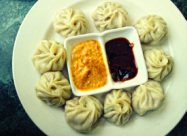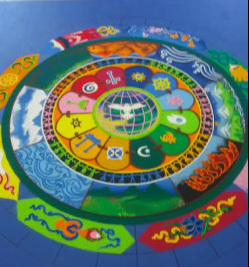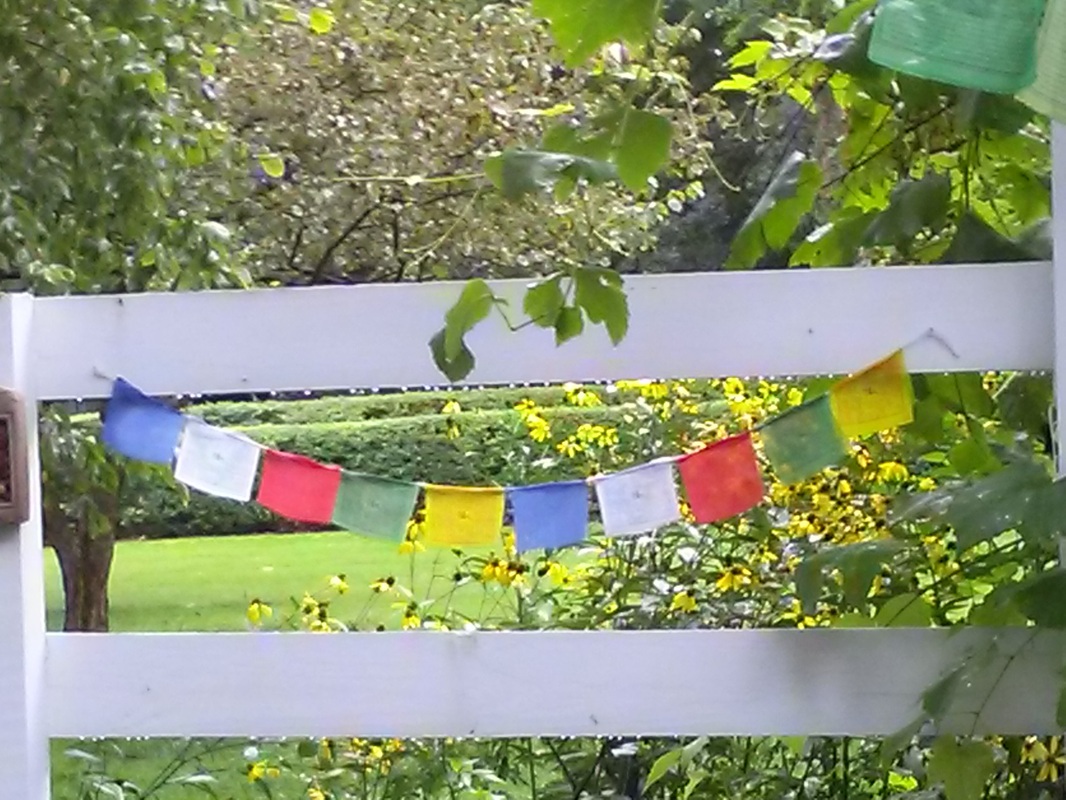
Most of the monastic group did not speak English, but one young man approached us who did. He wanted to practice his language skills. As he put it "you don't need to know Tibetan, but I need to know English." He was a lovely, gentle soul who told us about being called to the monastic life at age nine. He was born in Northern India, and so his main language is Hindi. He asked his parents' permission to join the order and they granted it. He said it was very hard to be a very young person in such a serious place who needed to learn the language. However, his natural intelligence was immediately apparent. Anytime he didn't understand a question or comment he would think about it and ask about for clarification rather than just remaining confused. We truly enjoyed getting to know him and could feel the calm and goodness emanating from his being.
I won't claim to be an expert on Tibet, but elements from this culture have been making their way more and more into my life of late. A couple of friends traveled to Tibet in June and brought me back a wooden flute. It's beautiful to look at, sounds pretty and smells of woodsmoke. It makes me happy just to hold it and I will treasure learning how to play it.
A few years ago my mother bought me a book by the Dalai Lama How to Practice: The way to a meaningful life. It was a thoughtful holiday gift as she knew I was exploring yoga and meditation. Having tried to read it at that time, I found myself simply impatient and irritated with it. I felt that little of what the Dalai Lama was saying truly applied to my life. The other day I picked this up again and was amazed to find myself connecting with his advice. It is clear that I've grown since I last tried to penetrate the meanings of his words of wisdom.
A couple of years ago, I came across a children's book at our school library called Tibet: Through the Red Box by Czech author Peter Sis. Not really a children's book, this gorgeously illustrated memoir tells of the author's father, a filmmaker, being sent to Tibet to show the Chinese how to make documentary films of the huge works they were undertaking (like highway building). His father kept a red box of notes and mementos which he later left to the son (the author). The book is a luminous study in how children perceive things differently than adults. I loved this book so much that I had to buy my own copy. Each time I read it I feel a sense of wonder.
And, in New York city a few years ago, I came across a magnificent exhibition at the Natural Museum of History on Tibetan medical paintings. I could not believe the level of detail, organization and study in the pieces that were hundreds of years old. It showed great curiosity and comprehension of the human body. Since touring this collection, I have made it a point to read more on the ancient healing traditions of Tibetan sages.
One theme runs through all of these experiences--they all left me with a sense of wonder and peace. They all took me to a better, simpler version of myself (one less worried about being sophisticated or proud of being complicated). I love this feeling--the feeling of immediate connection and rightness that you get from certain people or pursuits. Though it doesn't perhaps happen nearly as often as I would like, there have been enough times where I meet someone and just know that we are going to "click." There are times when I come across a particular artist, music, or author and know that I will be swept away.
So what lessons can we take away?
- Be willing to explore new cultures and see what fresh perspectives they have to offer. Art museums in our time are realizing that this is a niche they can fill and offer wonderful programs to educate.
- Try new foods, especially with those who are expert in preparing them. Food is an immediate way to connect. Don't be fussy or self-righteous. A little extra spice, fat, gluten or meat in the interest of cultural understanding is a small "sacrifice" to make!
- See the intelligence, beauty and accomplishment of other cultures. A little internet research can make new worlds accessible at your fingertips. It's easy now to be an armchair traveler.
- Approach life like a buddhist monk: 1) See the delight in simple pleasures like a wind chime, a flag blowing in the wind, birdsong, a soft breeze. 2) Walk softly. 3) Listen more than you speak. 4) Smile with both your mouth and eyes. 5) Sit quietly for a few minutes each day.
Though peace in our world may seem improbable, we can all move humankind forward by approaching our own lives peacefully with the choices we make everyday. Choose openness, softness and gentleness and watch the world unfold like a lotus blossom.
Artfully yours--Lisabeth


 RSS Feed
RSS Feed